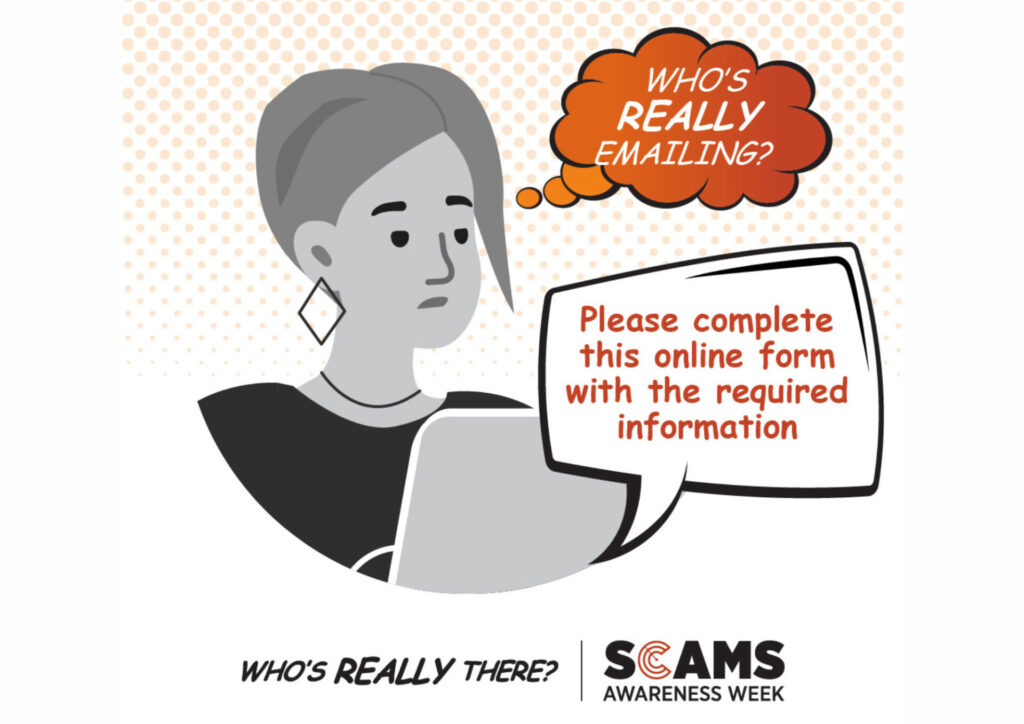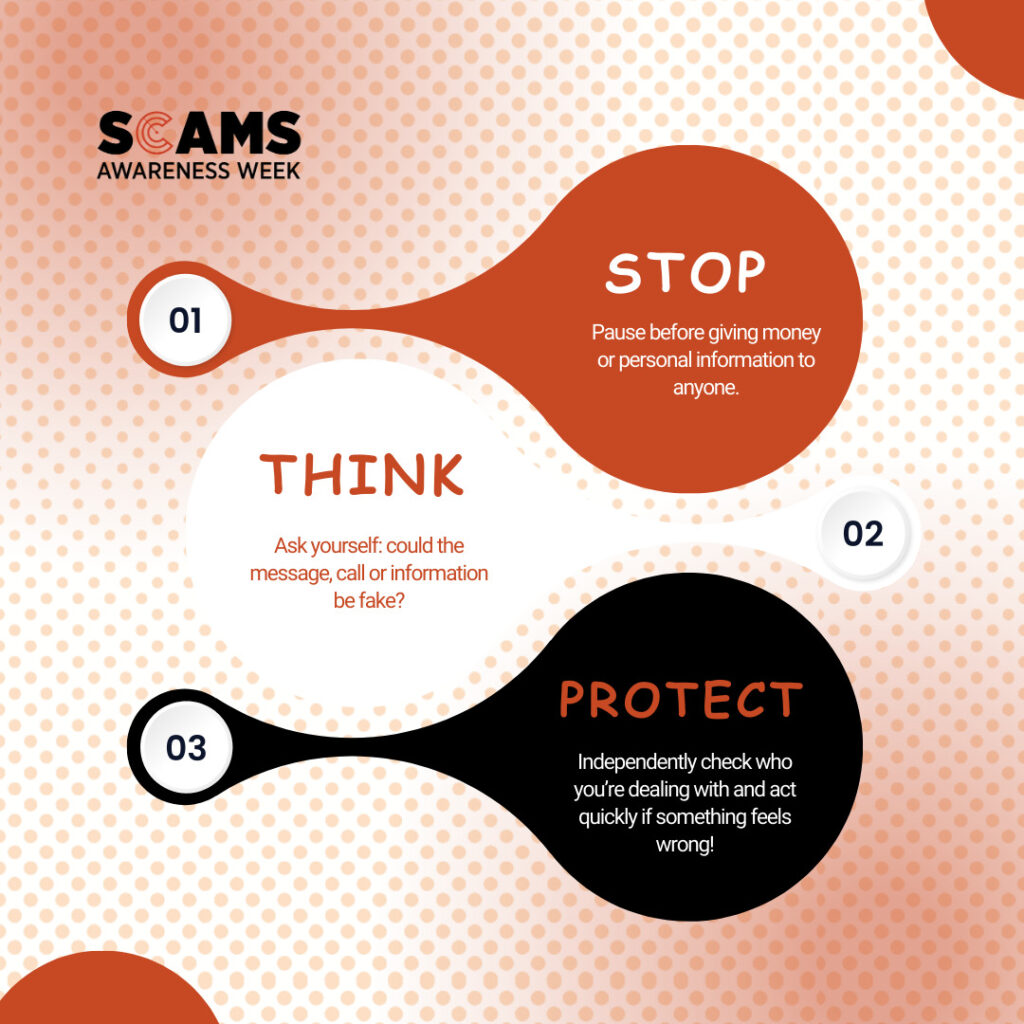The impersonator’s trap: How to spot and avoid Impersonation Scams
As we embark on Scam Awareness Week, Australians are being asked to sharpen their senses against the ever-growing threat of impersonation scams. This is where a scammer impersonates or pretends to be another person or well known business, institution or well known brand in order to steal money from you. According to Scamwatch and the Australian Competition and Consumer Commission (ACCC), at 30 September 2023 there were 234,672 reports of scams with over $397 million in losses. 72.5% of these reports involved Impersonation scams.
These scams target not just inexperienced people; they are sophisticated enough to deceive anyone – even people who are informed about them (scams). To recognise and avoid scams, read our blog How to recognise and avoid scams.
Impersonation scams can take many forms, from the classic phone call claiming to be from the ATO demanding immediate payment to more complex schemes involving emails or messages impersonating your bank or a government department. As these scammers become increasingly astute, we must stay one step ahead.
Scam Awareness Week helps us to understand the dark tactics of these scammers. By understanding these tactics we will equip ourselves with knowledge to prevent scammers from stealing our money and our personal information. We can protect ourselves and our communities from these scammers with the correct information and a vigilant eye.
Understanding Impersonation Scams
Imagine getting a call from someone who knows your name, claims to work for the government, and says that you owe them money. That’s scary, right? Well, that’s what impersonation scams are all about—scammers pretending to be someone they’re not to steal your money. Scammers pretend to be someone you trust—like your bank, a police officer, a government worker, well-known companies, charities, celebrities or even family and friends.
These scams are a big problem. According to Scamwatch data, between 01 January and 30 September 2023, the top three most reported impersonation scams were toll scams (19,141 reports), Australian Government impersonation scams (17,770 reports) and hi mum/family impersonation scams (9,307 reports).
How do scammers reach you? Methods of impersonation scams
Impersonation scams, a prevalent form of fraud, involve scammers assuming false identities to mislead victims. These scammers use a number of sophisticated techniques to appear credible:






Impersonation scammers might possess or profess to have specific details about you, employing this knowledge to persuade you of their authenticity.
“Impersonation scams are becoming increasingly sophisticated and therefore harder to identify” Scam Awareness Week 2023

Recognising the Red Flags: How to spot impersonation scam
In an era increasingly dominated by digital interactions, the sophistication of impersonation scams has escalated, presenting a significant challenge to individuals and businesses alike. Discerning the authenticity of communications has become crucial. Understanding and recognising the signs of these deceptive practices is imperative. This section aims to delineate these indicators, providing you with the knowledge to safeguard your personal and financial information effectively.
Impersonation scam red flags






How to avoid impersonation scams
Staying one step ahead of scammers is key. Scammers are clever. However, you can protect yourself with the right strategies and prevent yourself from being a scam victim. Here’s what you need to know to build a strong defence against impersonation scams:




“Consumers are urged to ‘Stop, think, protect'” – Scamwatch
What to do if you fall victim to a scam: Victim support
Finding out you’ve been scammed is a horrible experience. It’s okay to feel upset, but it’s crucial to act fast. Here’s what to do if you suspect you’re a victim of an impersonation scam:
Contact your bank
If you’ve shared financial details or sent money, contact your bank immediately. Banks help secure your accounts and prevent any further losses. Ask them to stop any transactions.
Seek Support
IDCARE is Australia and New Zealand’s national identity and cyber support service. They can help you make a plan (for free) to limit the damage. Call them on 1800 595 160 or visit their website to learn more.
If you’re feeling overwhelmed, reach out for support. Some organisations can help you navigate a scam’s emotional and financial aftermath. If you need someone to talk to, contact family and friends, or you can contact Lifeline (13 11 14) or Beyond Blue (1300 22 4636).
Stay Informed
Keep an eye on your accounts and credit reports in the coming months. Sometimes, the scam’s effects can be delayed.
Share your experience
Tell your friends and family about your experience to protect them from becoming victims.

Reporting the impersonation scam
Reporting the impersonation scam contributes to help the community at large. Get in touch with Scamwatch (report here) — a service the Australian Competition and Consumer Commission (ACCC) provides. Please provide them with as much detail as possible about the scam, including any communication you received, like emails or phone numbers.
This information is invaluable for the ACCC to track scam patterns and potentially identify the scammers. Your report could be the key that helps prevent future scams and protect others from falling victim. Making an official report to the police online helps to prevent and stop the scams. Consider the police report if the scam involves significant financial loss. Reporting to law enforcement ensures that the crime is officially recorded and investigated.
Remember, by reporting the scam, you’re taking a powerful stand against scammers and aiding in the fight to keep Australia safe from scams.
Be cautious, and do not let anyone force, convince or manipulate you to send money overseas: Impersonation scams
Rocket Remit understands that many people need to send money overseas to help family and friends or charities. However, criminals target vulnerable people in Australia and convince or manipulate them to send money abroad. It is your responsibility to protect yourself against scams.
At Rocket Remit, we take extra protection layers to secure our personal customer information. We are committed to improving Online Safety for all of our customers. If you have any questions of doubts about who you are sending to please contact us.
About Rocket Remit
Rocket Remit is the world’s fastest international money transfer service. Send money instantly to over 50 overseas countries at very competitive rates.
Use the country selector to choose the country and check the rate.
Click here for more information on how to send money using Rocket Remit.